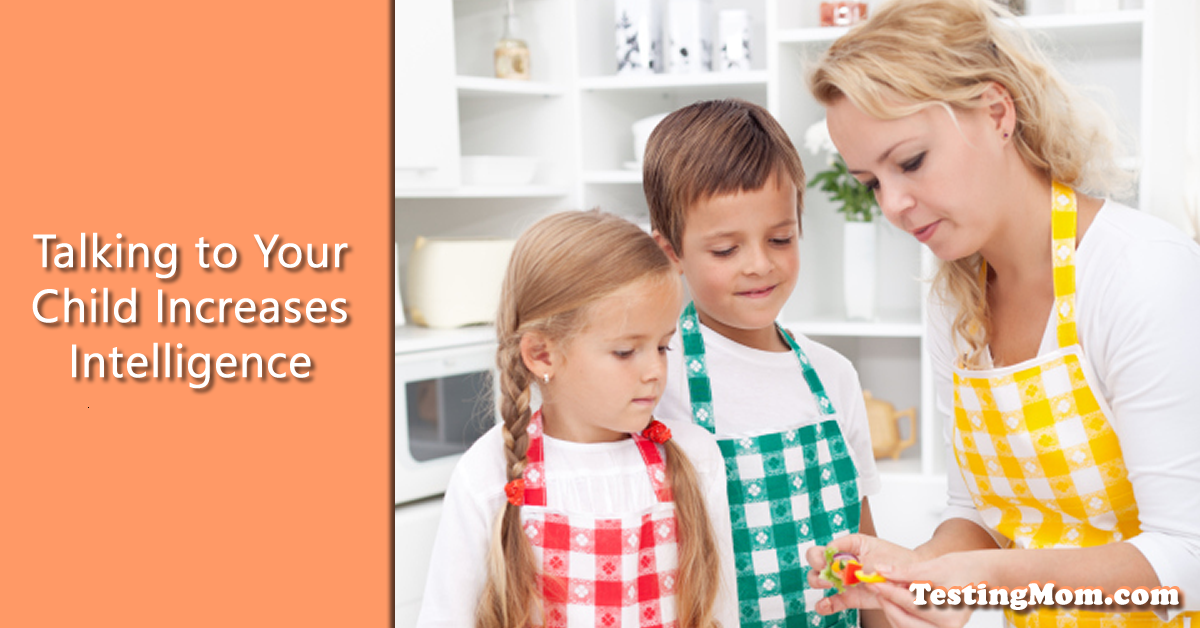› Why Talking to Your Child Increases Intelligence
Why Talking to Your Child Increases Intelligence
posted by Karen Quinn, The Testing Mom - May 23rd, 2016
How Many Words Do You You Share With Your Child Every Day?
Did you know that talking to your child is one of the most important things you can do for your child’s intellectual development? Don’t take my word for it — Drs. Betty Hart and Todd Risley analyzed more than 46,000 hours of speech between parents and children aged seven months to three years old, which showed the average number of words a typical four-year-old born into various family income levels has heard. For instance, in a professional family, it’s 45 million words; in a working-class family, it’s 26 million words… and in a family that’s living in poverty, it’s sadly only 13 million words. That boils down to 2,153, 1,251 and 616 words per day, respectively. Furthermore, welfare-recipient children only know 500 words by age three, compared with 750 and 1,100 in the other groups.
Talkativeness has a Great Impact on Your Child’s IQ!
So according to their research, children raised in a “low language” environment had an average IQ of 79, while children in “medium language” environments had an average IQ of 107 — and in an “enriched language” environment, children had an average IQ of 117. That’s a 38-point difference between low- and high-language homes! And the authors found that by age nine, academic success was correlated to the number of words children had heard when they were younger. As a result, the researchers concluded that the variation in children’s IQs, language abilities, and academic success were directly related to the number of words the parents spoke to their children. Furthermore, they also found that parent talkativeness was more predictive of a high IQ than socioeconomic status or race.
“Absorbent Mind” Time Equals Unconscious Learning for Your Child.
That’s why I HIGHLY recommend that you talk to your child as much as possible, no matter where you are or what others might think of you–it increases their intelligence! And you should be doing this from the time your child is an infant until about age three – this is what Maria Montessori called an “absorbent mind” time, meaning your child learns by absorbing what he or she sees, hears, touches, smells and feels. It’s an unconscious kind of learning which children pick it up without effort.
After age three, your child will not only learn by absorbing words but also become actively involved in gaining knowledge and skills. Your child will start asking questions, and the more you talk to each other, the more language, information and understanding of his or her world your child will absorb. But remember to only use high-level vocabulary, not baby talk!
Conversation is Key!
Through this kind of back-and-forth interaction, your child innately begins to understand the power of language to communicate. And, by doing so, this can affect your child’s expressive language, receptive language, knowledge base, similarities, classifications and math. I mean, depending on the conversation topic, talking to your child can affect every ability he or she needs before kindergarten except fine-motor skills!
Then, once your child gets older and is a more well-versed conversationalist, not only should you drive the conversation, listen, and expand upon it, but now you should also ask your child to elaborate or make connections between the topic and experiences in real life.




Tell us about your experiences